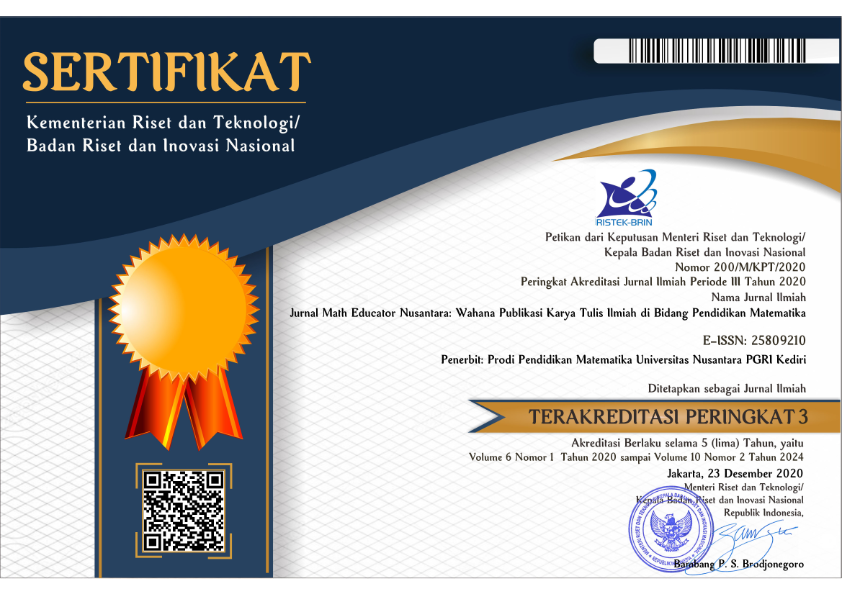Development of hots-based math textbooks to improve critical thinking skills
DOI:
https://doi.org/10.29407/jmen.v9i2.20033Keywords:
Textbook, Higher Order Thinking Skills, Students' critical thinkingAbstract
The trend of new jobs in the future is based on digital technology, so that future needs are graduates from madrasahs who have analytical skills who can think critically. Making textbooks that are valid, practical and effective and in accordance with the needs of students is one way to cultivate a critical thinking attitude independently. The purpose of this research and development is to (1) develop a valid, practical and effective mathematics textbook. (2) knowing the effect of the use of HOTS-based mathematics textbooks on the crisis thinking ability of grade VII MTsN 7 Nganjuk students. The research and development model is the Borg ang Gall model. The data collection method uses validation sheets, observation sheets for the implementation of textbooks, student response questionnaires and tests to measure students' critical thinking skills. The subject is a student of class VII MTsN 7 Nganjuk. The data analysis technique uses a t-test using SPSS. . This research and development resulted in a product in the form of a valid textbook with the validation results of material experts 87%, media experts 85%. Practically based on the results of the student response questionnaire which is 89%. Effectively based on data from the post test value analysis using the t test, the learning outcomes using textbooks have a significant difference in the value of critical thinking ability compared to classes that do not use textbooks of 0.001 or < 0.05.
References
Brog., W.R. & Gall., M., D. (2007). Educational Research: An Introduction. New
Dwijayanti, N. (2021). Pembelajaran berbasis HOTS sebagai bekal generasi abad 21 di masa pandemi. Kalam Cendekia: Jurnal Ilmiah Kependidikan, 9(1), 332-336. DOI: https://doi.org/10.20961/jkc.v9i1.53837
Fuada, S. (2015, November). Pengujian validitas alat peraga pembangkit sinyal (oscillator) untuk pembelajaran workshop instrumentasi industri. In Prosiding Seminar Nasional Pendidikan (SEMNASDIK) (pp. 854-861).
Halim, A. . (2022). Signifikansi dan Implementasi Berpikir Kritis dalam Proyeksi Dunia Pendidikan Abad 21 Pada Tingkat Sekolah Dasar. Jurnal Indonesia Sosial Teknologi, 3(03), 404–418. https://doi.org/10.59141/jist.v3i03.385
Illahi, K., Pujiastuti, H., & Samsuri, S. (2019). Pengaruh pendekatan model eliciting activities (MEAs) terhadap kemampuan berpikir kritis dan disposisi matematis siswa. Jurnal Math Educator Nusantara: Wahana Publikasi Karya Tulis Ilmiah Di Bidang Pendidikan Matematika, 5(2), 190-197. https://doi.org/10.29407/jmen.v5i2.12891
Indahri, Y. (2021). Asesmen nasional sebagai pilihan evaluasi sistem pendidikan nasional. Aspirasi: Jurnal Masalah-masalah Sosial, 12(2), 195-215. DOI: https://doi.org/10.46807/aspirasi.v12i2.2364
Kemendikbud. Indeks Aktivitas Literasi Membaca 34. Pusat Penelitian Kebijakan Pendidikan Dan Kebudayaan, Badan Penelitian Dan Pengembangan, Kementerian Pendidikan Dan Kebudayaan, 2019.
Kompas.com (2019). Literasi Baca Indonesia Rendah, Akses Baca Diduga Jadi Penyebab. https://amp.kompas.com/edukasi/read/2019/06/23/07015701/literasi-baca-indonesia-rendah-akses-baca-diduga-jadi-penyebab (dikases 10 Februari 2022)
McKenney, S., & Reeves, T. C. (2014). Educational design research. Handbook of research on educational communications and technology, 131-140.
Novita, N., Mellyzar, M., & Herizal, H. (2021). Asesmen Nasional (AN): Pengetahuan dan persepsi calon guru. JISIP (Jurnal Ilmu Sosial dan Pendidikan), 5(1). DOI: http://dx.doi.org/10.58258/jisip.v5i1.1568
Oktariani, O., & Ekadiansyah, E. (2020). Peran Literasi dalam Pengembangan Kemampuan Berpikir Kritis. Jurnal Penelitian Pendidikan, Psikologi dan Kesehatan (J-P3K), 1(1), 23-33. DOI: https://doi.org/10.51849/j-p3k.v1i1.11
Prameswari, S. W., Suharno, S., & Sarwanto, S. (2018). Inculcate critical thinking skills in primary schools. In Social, Humanities, and Educational Studies (SHEs): Conference Series (Vol. 1, No. 1).
Rohim, D. C. (2021). Konsep asesmen kompetensi minimum untuk meningkatkan kemampuan literasi numerasi siswa sekolah dasar. Jurnal Varidika, 33(1), 54-62. DOI: 10.23917/varidika.v33i1.14993
Rohman, A. (2022). Literasi dalam Meningkatkan Kemampuan Berpikir Kritis di Era Disrupsi. EUNOIA (Jurnal Pendidikan Bahasa Indonesia), 2(1), 40-47. DOI: http://dx.doi.org/10.30821/eunoia.v2i1.1318
Rosyadi, I. (2022). Reformasi ketenagakerjaan. Diakses pada tanggal 22 Februari 2022 dari https://radarsolo.jawapos.com/opini/841677769/reformasi-ketenagakerjaan-dan-peran-pt
Sani, R. A. (2019). Pembelajaran berbasis hots edisi revisi: higher order thinking skills (Vol. 1). Tira Smart.
Santia, I., & Jatmiko, J. (2016). Pengembangan modul pembelajaran matematika berdasarkan proses berpikir relasional dalam upaya meningkatkan kemampuan menyelesaikan masalah aljabar siswa SMP. Jurnal Math Educator Nusantara: Wahana Publikasi Karya Tulis Ilmiah Di Bidang Pendidikan Matematika, 2(1). https://doi.org/10.29407/jmen.v2i1.394
Santia, I., Fiantika, F. R., & Jatmiko, J. (2017). Pengembangan BKS Berbasis MCK (Mathematical Content Knowledge) Sebagai Upaya Meningkatkan Literasi Matematika Siswa SMP. Jurnal Math Educator Nusantara: Wahana Publikasi Karya Tulis Ilmiah Di Bidang Pendidikan Matematika, 3(2), 127–134. https://doi.org/10.29407/jmen.v3i2.909
Saputra, H. (2020). Kemampuan berfikir kritis matematis. Perpustakaan IAI Agus Salim, 2, 1-7.
Sujanem, R., Suwindra, I. N. P., & Suswandi, I. (2022). Efektivitas E-Modul Fisika Berbasis Masalah Berbantuan Simulasi Phet dalam Ujicoba Terbatas untuk Meningkatkan Keterampilan Berpikir Kritis Siswa SMA. Jurnal Pendidikan Fisika Undiksha, 12(2), 181-191. DOI: https://doi.org/10.23887/jjpf.v12i2.54395
Syamsi, K., Sari, E. S., & Pujiono, S. (2013). Pengembangan model buku ajar membaca berdasarkan pendekatan proses bagi siswa SMP. Jurnal Cakrawala Pendidikan, 5(1). DOI: https://doi.org/10.21831/cp.v5i1.1262
Tju, M., & Murniarti, E. (2021). Analisis pelatihan asesmen kompetensi minimum. Jurnal Dinamika Pendidikan, 14(2), 110-116. https://doi.org/10.51212/jdp.v14i2.7
Wijayanti, T. F., Prayitno, B. A., & Sunarto, S. (2016). Pengembangan modul berbasis berpikir kritis disertai argument mapping pada materi sistem pernapasan untuk meningkatkan kemampuan berpikir kritis siswa kelas xi sma negeri 5 surakarta. Inkuiri, 5(1), 105-111.
Downloads
Published
Issue
Section
License
Authors who publish with this journal agree to the following terms:
- Copyright on any article is retained by the author(s).
- The author grants the journal, the right of first publication with the work simultaneously licensed under a Creative Commons Attribution License that allows others to share the work with an acknowledgment of the work’s authorship and initial publication in this journal.
- Authors are able to enter into separate, additional contractual arrangements for the non-exclusive distribution of the journal’s published version of the work (e.g., post it to an institutional repository or publish it in a book), with an acknowledgment of its initial publication in this journal.
- Authors are permitted and encouraged to post their work online (e.g., in institutional repositories or on their website) prior to and during the submission process, as it can lead to productive exchanges, as well as earlier and greater citation of published work.
- The article and any associated published material is distributed under the Creative Commons Attribution-ShareAlike 4.0 International License













